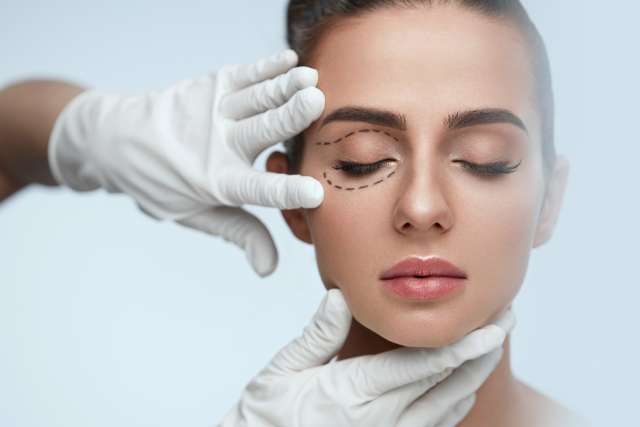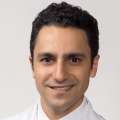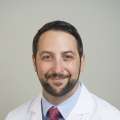Orbital and Ophthalmic Plastic Surgery
Our plastic surgeons use advanced techniques to treat orbital disease and enhance facial appearance. We also train fellows and teach other orbital specialists from around the world.

Why choose UCLA Health for orbital and ophthalmic plastic surgery?
Our orbital and ophthalmic plastic surgeons offer surgical treatment for patients with orbital disease and injuries and those interested in enhancing their appearance. The orbit is a cavity in the skull known as the eye socket. It houses the eyeball and its muscles, blood vessels and nerves. The orbit may be affected by inflammation, infection, tumors or trauma.
Our team is part of the UCLA Health Stein Eye Institute and Doheny Eye Centers, ranked among the best in the nation for ophthalmology care by U.S. News & World Report.
Highlights of our program include:
Multispecialty care: We work with experts in ophthalmology, interventional neuroradiology, neurosurgery, head and neck surgery, radiation oncology and craniofacial surgery to offer a breadth of experience not available elsewhere in Southern California.
Renowned physician expertise: Our surgeons are recognized experts in orbital and ophthalmic plastic surgery. We teach courses that attract orbital specialists from all over the world. We also lead a fellowship program to train future leaders in orbital and ophthalmic plastic surgery.
Advanced surgical techniques: We continually research and implement new surgical techniques to offer patients the most advanced care. For example, the specialists in our Aesthetic Center have pioneered minimal incision surgery techniques that enhance facial appearance and function.
Our services
Our orbital and ophthalmic plastic surgery team provides extensive services. We research, diagnose and treat a wide range of eye conditions.
Aesthetic Center
Since 1998, surgeons trained in both ophthalmic and plastic surgery have delivered individualized, high-quality care through our Aesthetic Center.
A major focus of the Center is to research facial aging and surgical healing. We also conduct studies to develop new techniques for aesthetic surgery, continually offering patients the most effective, innovative treatments.
Orbital Disease Center
The Orbital Disease Center brings multispecialty expertise to the research and treatment of orbital diseases. Multiple physicians work together to care for patients with orbital diseases arising from trauma, cancer, inflammation and infection.
We offer nonsurgical and surgical treatments for orbital disease, using several procedures not available elsewhere in the region. The Center also leads a research program for thyroid eye disease to learn new surgery techniques and best practices.
Conditions we treat
We offer treatment for a wide range of diseases affecting the eye, including:
Eye tumors: An irregular mass of cells occurring anywhere on or in the eye. Eye tumors may start in the eye (primary tumors) or spread from other parts of the body (secondary tumors).
Eyelid disorders: Conditions of the eyelids, including skin cancers and lesions (growths) on the eyelid
Blepharoptosis: An eyelid disorder that causes drooping of the upper eyelids, often blocking the pupil and impairing vision
Graves’ eye disease (thyroid eye disease): An autoimmune disease that affects thyroid function. Eye symptoms may include inflammation in the white part of the eyeball, eyelid swelling or bulging of the eyes.
Lacrimal disorders: Conditions that affect the part of the eye that makes tears (lacrimal gland)
Orbital fractures: Breaks in one or more of the bones that make up the eye socket (orbital bone)
Ophthalmic plastic surgeries we offer
Ophthalmic plastic surgeons treat patients who want to enhance their appearance, as well as patients with orbital diseases or injuries.
Eye aesthetics procedures
Aesthetic procedures we provide include:
Endoscopic eyebrow lift: In this minimally invasive procedure, the surgeon makes small incisions in the hairline, gently lifts the skin around the eyebrows and holds it in place with small stitches.
Facelift (rhytidectomy): The surgeon makes small incisions around the hairline or ear, then gently lifts skin on both sides of the face. They may also sculpt or remove fat in the face and neck.
Fat transfers: These procedures move fat from one area of the body to another to improve appearance. For example, people may have a fat transfer to the face to create a more youthful look.
Fillers and injections: These facial injections of hyaluronic acid or botulinum toxin can reduce wrinkles and fine lines.
Minimal incision blepharoplasty: This surgery is designed to address age related changes in the upper and lower eyelids by conservatively removing skin or fat in the upper and lower eyelids.
Laser skin resurfacing: The surgeon uses a laser to remove the top layer of skin. New collagen fibers form, revealing tighter, more youthful skin. People use this treatment to minimize fine lines, wrinkles, scars or blemishes.
Surgery for orbital disease
Our ophthalmic plastic surgeons work with a team of specialists, including ophthalmologists and head and neck surgeons, to provide orbital disease treatment. We offer procedures such as:
Bony reconstruction: In this complex procedure, surgeons rebuild the orbital bone after traumatic injury, congenital abnormality, infection or disease.
Optic canal decompression: This procedure relieves pressure on the optic nerve (optic neuropathy). Surgeons make small incisions in the nose and sinuses and remove a small portion of bone in the tunnel where the optic nerve runs (optic canal).
Orbital decompression: This surgery removes a portion of the orbital bone to reduce the appearance of bulging eyes. Surgeons use orbital decompression to treat Graves’ eye disease.
Meet our team
Our team includes experts who are trained in both ophthalmology and plastic surgery. We continually research new treatments and train others in the latest techniques.
Contact us
Call 310-206-8250 to request an appointment with an ophthalmic plastic surgeon at UCLA Health.
Find your care
We offer both aesthetic treatments and surgery for orbital disease. Call 310-206-8250 to find out more about our services.





